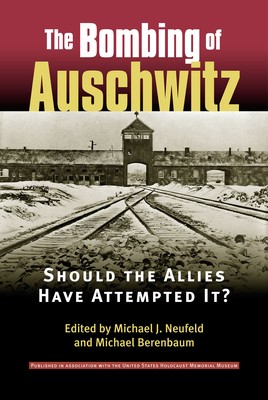
- We will send in 10–14 business days.
- Publisher: University Press Of Kansas
- ISBN-10: 0700612807
- ISBN-13: 9780700612802
- Format: 16 x 23.6 x 2.7 cm, softcover
- Language: English
- SAVE -10% with code: EXTRA
The Bombing of Auschwitz (e-book) (used book) | bookbook.eu
Reviews
Description
Did we "know" the gas chambers were there? Could we have destroyed them? Why didn't we bomb?
For decades, debate has raged over whether the Allies should have bombed the gas chambers at Auschwitz and the railroads leading to the camp, thereby saving thousands of lives and disrupting Nazi efforts to exterminated European Jews. Was it truly feasible to do so? did failure to do so simply reflect a callous indifference to the plight of the Jews or was it a realistic assessment of a plan that could not succeed? In this volume, a number of eminent historians address and debate those very questions. Published in association with the United States Holocaust Memorial Museum, this is the first paperback edition of a book that has been widely hailed by critics and cited by Kirkus Reviews as "the definitive resource for understanding this deeply troubling episode in the twentieth century's greatest horror." Prominent scholars such as Sir Martin Gilbert, Walter Laqueur, Michael Berenbaum, Gerhard Weinberg, and Williamson Murrag offer a diverse array of mutually supporting and competing perspectives on the subject. In the process, they shed important light on how much knowledge of Auschwitz Allied intelligence actually had and on what measures the Allies might have taken to halt the killing. The book is also rich in documentary evidence--including the correspondence of Churchill, Roosevelt, Cordell Hull, Anthony Eden, and John McCloy--that reveals just how much these men knew about the situation and what they thought about its potential resolution. It also includes a selection of the most important documents and aerial reconnaissance photos from 1944 exploring the feasibility of an air strike. Ultimately, these contributions show that the dilemma over Auschwitz was far more complex than criticisms of inaction would suggest. The Bombing of Auschwitz is an unusual volume that confronts life-and-death questions and addresses a matter of enduring interest for all readers of World War II and Holocaust history.EXTRA 10 % discount with code: EXTRA
The promotion ends in 17d.00:20:48
The discount code is valid when purchasing from 10 €. Discounts do not stack.
- Publisher: University Press Of Kansas
- ISBN-10: 0700612807
- ISBN-13: 9780700612802
- Format: 16 x 23.6 x 2.7 cm, softcover
- Language: English English
Did we "know" the gas chambers were there? Could we have destroyed them? Why didn't we bomb?
For decades, debate has raged over whether the Allies should have bombed the gas chambers at Auschwitz and the railroads leading to the camp, thereby saving thousands of lives and disrupting Nazi efforts to exterminated European Jews. Was it truly feasible to do so? did failure to do so simply reflect a callous indifference to the plight of the Jews or was it a realistic assessment of a plan that could not succeed? In this volume, a number of eminent historians address and debate those very questions. Published in association with the United States Holocaust Memorial Museum, this is the first paperback edition of a book that has been widely hailed by critics and cited by Kirkus Reviews as "the definitive resource for understanding this deeply troubling episode in the twentieth century's greatest horror." Prominent scholars such as Sir Martin Gilbert, Walter Laqueur, Michael Berenbaum, Gerhard Weinberg, and Williamson Murrag offer a diverse array of mutually supporting and competing perspectives on the subject. In the process, they shed important light on how much knowledge of Auschwitz Allied intelligence actually had and on what measures the Allies might have taken to halt the killing. The book is also rich in documentary evidence--including the correspondence of Churchill, Roosevelt, Cordell Hull, Anthony Eden, and John McCloy--that reveals just how much these men knew about the situation and what they thought about its potential resolution. It also includes a selection of the most important documents and aerial reconnaissance photos from 1944 exploring the feasibility of an air strike. Ultimately, these contributions show that the dilemma over Auschwitz was far more complex than criticisms of inaction would suggest. The Bombing of Auschwitz is an unusual volume that confronts life-and-death questions and addresses a matter of enduring interest for all readers of World War II and Holocaust history.

Reviews